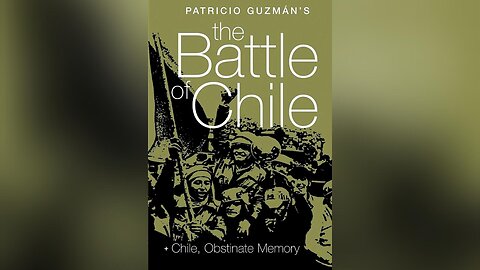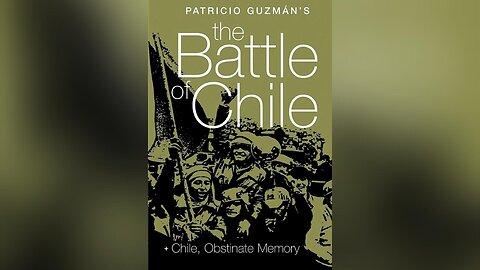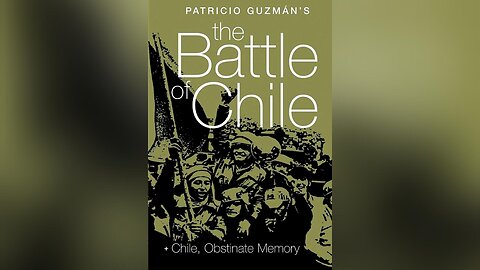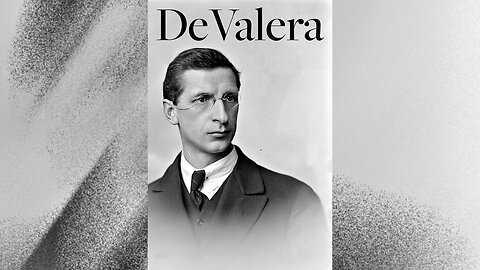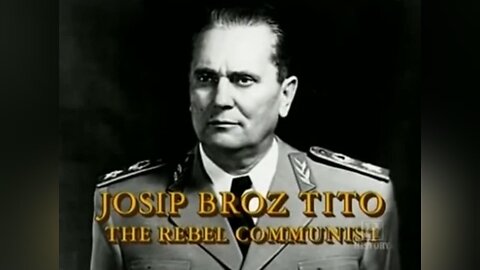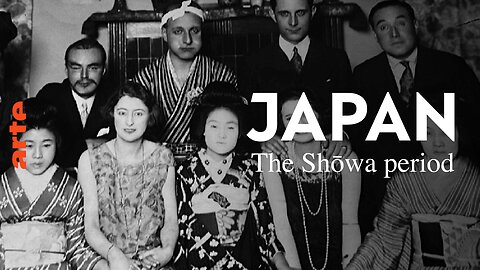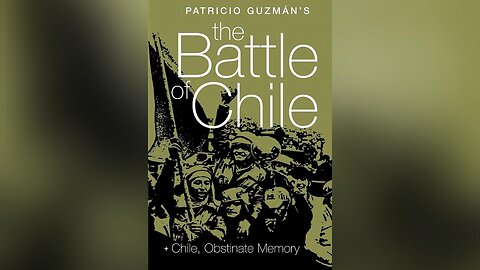
Contemporary History & Politics
40 videos
Updated 2 months ago
-
The Battle of Chile | The Insurrection of the Bourgeoisie (Part 1-MULTISUB)
 Adaneth - History&PoliticsThe Battle of Chile: Struggle of an Unarmed People (Spanish: La batalla de Chile: La lucha de un pueblo sin armas) is a Chilean-Cuban documentary film, by Chilean filmmaker Patricio Guzmán, in three parts. This is the restored version, with audio in French with subtitles in English, Italian and Spanish (click on CC for subtitles). A chronicle of the political tension in Chile in 1973 and of the military coup against the government of Salvador Allende. Part 1: The film opens in March 1973 with reporters asking people how they intend to vote in the coming congressional election. The election is taking place after Allende has been in office for over two years and has been trying to reorganize society along democratic socialist lines. His "Popular Unity" coalition was put into office with only a third of the popular vote. His efforts to nationalize certain industries have met with both internal and foreign opposition, and Chile is suffering economic deprivations. In the 1973 Chilean parliamentary election, Allende makes gains to 43.4 percent of the votes, though the opposition bloc is strong too, up to 56 percent. The film has street interviews, speeches, violent confrontations, the mobs, and meetings, the parades with workers chanting. Part One finishes with newsreel footage from an Argentine cameraman Leonardo Henrichsen who was photographing street skirmishes. A soldier takes aim and kills the cameraman, and the image spins skyward. Part 2: https://rumble.com/v71mk6o-the-battle-of-chile-the-coup-dtat-part-2-multisub.html95 views
Adaneth - History&PoliticsThe Battle of Chile: Struggle of an Unarmed People (Spanish: La batalla de Chile: La lucha de un pueblo sin armas) is a Chilean-Cuban documentary film, by Chilean filmmaker Patricio Guzmán, in three parts. This is the restored version, with audio in French with subtitles in English, Italian and Spanish (click on CC for subtitles). A chronicle of the political tension in Chile in 1973 and of the military coup against the government of Salvador Allende. Part 1: The film opens in March 1973 with reporters asking people how they intend to vote in the coming congressional election. The election is taking place after Allende has been in office for over two years and has been trying to reorganize society along democratic socialist lines. His "Popular Unity" coalition was put into office with only a third of the popular vote. His efforts to nationalize certain industries have met with both internal and foreign opposition, and Chile is suffering economic deprivations. In the 1973 Chilean parliamentary election, Allende makes gains to 43.4 percent of the votes, though the opposition bloc is strong too, up to 56 percent. The film has street interviews, speeches, violent confrontations, the mobs, and meetings, the parades with workers chanting. Part One finishes with newsreel footage from an Argentine cameraman Leonardo Henrichsen who was photographing street skirmishes. A soldier takes aim and kills the cameraman, and the image spins skyward. Part 2: https://rumble.com/v71mk6o-the-battle-of-chile-the-coup-dtat-part-2-multisub.html95 views -
The Battle of Chile | The Coup d'état (Part 2-MULTISUB)
 Adaneth - History&PoliticsPart 2: Begins with the right wing violence of the winter of 1973 against the government. Army troops seize control of downtown Santiago - but the attempted coup is snuffed out in a few hours. "The film leaps from one group to another...It shows the different elements in the explosive situation with so much clarity that it's a Marxist tract in which the contradictions of capitalism have sprung to life. We actually see the country cracking open. Step by step, the legal government is overthrown." Everybody in Chile seems to know the coup d'état is coming and talk about it openly - yet the people who have the most to lose can't get together enough to do anything. Allende's naval aide-de-camp Arturo Araya is killed, and the camera moves around the funeral attendees - General Augusto Pinochet among them. In July, the truck owners, funded by the CIA, begin their long strike, which paralyzes the distribution of food, gasoline, and fuel, and there is a call for Allende to resign. Instead, Allende holds a rally - around 800,000 people arrive, but they have no weapons. On September 11, the Navy institutes the coup d'état, and the Air Force bombs the state radio station. The palace is bombarded from the air. The chiefs of the junta on television are seen announcing they'll return the country to order after three years of "Marxist cancer". Part 3: https://rumble.com/v71mo3m-the-battle-of-chile-popular-power-part-3-multisub.html73 views
Adaneth - History&PoliticsPart 2: Begins with the right wing violence of the winter of 1973 against the government. Army troops seize control of downtown Santiago - but the attempted coup is snuffed out in a few hours. "The film leaps from one group to another...It shows the different elements in the explosive situation with so much clarity that it's a Marxist tract in which the contradictions of capitalism have sprung to life. We actually see the country cracking open. Step by step, the legal government is overthrown." Everybody in Chile seems to know the coup d'état is coming and talk about it openly - yet the people who have the most to lose can't get together enough to do anything. Allende's naval aide-de-camp Arturo Araya is killed, and the camera moves around the funeral attendees - General Augusto Pinochet among them. In July, the truck owners, funded by the CIA, begin their long strike, which paralyzes the distribution of food, gasoline, and fuel, and there is a call for Allende to resign. Instead, Allende holds a rally - around 800,000 people arrive, but they have no weapons. On September 11, the Navy institutes the coup d'état, and the Air Force bombs the state radio station. The palace is bombarded from the air. The chiefs of the junta on television are seen announcing they'll return the country to order after three years of "Marxist cancer". Part 3: https://rumble.com/v71mo3m-the-battle-of-chile-popular-power-part-3-multisub.html73 views -
The Battle of Chile | Popular Power (Part 3-MULTISUB)
 Adaneth - History&PoliticsPart 3: takes place in 1972-3, prior to the previous two installments. It primarily focuses on the workers' response to the "insurrection of the bourgeoise" captured in part 1. The workers respond to a strike of the employers and middle-class employees by occupying their factories and, as the strike is prolonged, attempting to run them themselves (autogestion). This leads to the formation of cordones industriales ('industrial belts', a form of workers' council) and opens up a debate on the left about the future of socialism and workers' power in Chile. The film features extensive interviews with Chilean industrial workers. Chile - Obstinate Memory: https://rumble.com/v71mpxg-the-battle-of-chile-chile-obstinate-memory.html91 views
Adaneth - History&PoliticsPart 3: takes place in 1972-3, prior to the previous two installments. It primarily focuses on the workers' response to the "insurrection of the bourgeoise" captured in part 1. The workers respond to a strike of the employers and middle-class employees by occupying their factories and, as the strike is prolonged, attempting to run them themselves (autogestion). This leads to the formation of cordones industriales ('industrial belts', a form of workers' council) and opens up a debate on the left about the future of socialism and workers' power in Chile. The film features extensive interviews with Chilean industrial workers. Chile - Obstinate Memory: https://rumble.com/v71mpxg-the-battle-of-chile-chile-obstinate-memory.html91 views -
The Battle of Chile | Chile - Obstinate Memory
 Adaneth - History&PoliticsChile, Obstinate Memory (Spanish: Chile, la memoria obstinada) is a documentary film, directed by Patricio Guzmán and released in 1997. The film profiles Guzmán's trip back to Chile, after years living and working outside the country, to screen his landmark documentary The Battle of Chile in the country for the first time. Audio in Spanish with hardcoded English subtitles. In Chile, Obstinate Memory, Guzmán explores the idea of identity and memory as it relates to the Chilean public. As opposed to The Battle of Chile, Chile, Obstinate Memory focuses more on the personal reflections of the filmmaker on returning to his home country. Whereas the original documentary is in the form of cinema verité, Chile, Obstinate Memory is a personal essay film Guzmán interviews people involved in the making of The Battle of Chile, speaks with Allende’s former guards, reflects on his own time being held by the military government, and overall focuses on the individual experiences under such a regime. The film explores the identity of the Chilean people in regards to the political changes of the nation during and after the Pinochet regime. Guzmán wanted to film the reaction of young students to the screening of The Battle of Chile, just as he had experience before the production of Obstinate Memory. He requested permission from 40 schools to do this but only 4 agreed. According to Guzmán, the rest of the schools refused because they were concerned about traumatizing the students and some suggested that it was better to forget the past.105 views
Adaneth - History&PoliticsChile, Obstinate Memory (Spanish: Chile, la memoria obstinada) is a documentary film, directed by Patricio Guzmán and released in 1997. The film profiles Guzmán's trip back to Chile, after years living and working outside the country, to screen his landmark documentary The Battle of Chile in the country for the first time. Audio in Spanish with hardcoded English subtitles. In Chile, Obstinate Memory, Guzmán explores the idea of identity and memory as it relates to the Chilean public. As opposed to The Battle of Chile, Chile, Obstinate Memory focuses more on the personal reflections of the filmmaker on returning to his home country. Whereas the original documentary is in the form of cinema verité, Chile, Obstinate Memory is a personal essay film Guzmán interviews people involved in the making of The Battle of Chile, speaks with Allende’s former guards, reflects on his own time being held by the military government, and overall focuses on the individual experiences under such a regime. The film explores the identity of the Chilean people in regards to the political changes of the nation during and after the Pinochet regime. Guzmán wanted to film the reaction of young students to the screening of The Battle of Chile, just as he had experience before the production of Obstinate Memory. He requested permission from 40 schools to do this but only 4 agreed. According to Guzmán, the rest of the schools refused because they were concerned about traumatizing the students and some suggested that it was better to forget the past.105 views -
Éamon de Valera - Ireland's Hated Hero
 Adaneth - History&PoliticsA 1999 BBC programme as part of Reputations series, narrated by Peter Capaldi. Ireland's leader for 21 years, Eamon de Valera was loved and hated in equal measure. A revolutionary, he became president of Sinn Fein in 1918, but his fight for independence led to civil war and he was seen as the scourge of the IRA. This film probes the contradictory, complex character of the prime minister who styled himself as the embodiment of the Irish nation.92 views 1 comment
Adaneth - History&PoliticsA 1999 BBC programme as part of Reputations series, narrated by Peter Capaldi. Ireland's leader for 21 years, Eamon de Valera was loved and hated in equal measure. A revolutionary, he became president of Sinn Fein in 1918, but his fight for independence led to civil war and he was seen as the scourge of the IRA. This film probes the contradictory, complex character of the prime minister who styled himself as the embodiment of the Irish nation.92 views 1 comment -
Josip Broz Tito - The Rebel Communist
 Adaneth - History&PoliticsA 1998 History Channel Documentary, narrated by Harlan Saperstein. Documentary on Josip Broz Tito who took control of fractious Yugoslavia after World War II and brought it under the banner of Communism. However, Tito refused to bow to Stalin's Moscow, creating the first serious rift among Soviet bloc countries.121 views
Adaneth - History&PoliticsA 1998 History Channel Documentary, narrated by Harlan Saperstein. Documentary on Josip Broz Tito who took control of fractious Yugoslavia after World War II and brought it under the banner of Communism. However, Tito refused to bow to Stalin's Moscow, creating the first serious rift among Soviet bloc countries.121 views -
Suez: A very British Crisis | Betrayal (Episode 1)
 Adaneth - History&PoliticsA 2006 BBC Three-part Documentary Series, narrated by Michael Pennington. The story of the Suez Crisis, how Britain invaded Egypt 50 years ago, making President Nasser a national hero and British prime Minister Anthony Eden a national disgrace. This BBC Two series tells the story of Suez using dramatic reconstructions and interviews with participants and witnesses to the crisis. Episode 1: The Suez Canal in Egypt was a symbol of western dominance. France and Britain were the major shareholders in the company that ran the canal and British troops occupied its banks. When Gamal Abdul Nasser came to power in 1954, his main objective was to remove the British from Egypt. The British Prime Minister, Anthony Eden, did not understand that the world had changed. Archive material, interviews, and dramatisations provide an insight into to the Suez crisis of 1956; the Egyptian uprising that brought Gamal Abdul Nasser to power and marked the end of British Empire. Episode 2: https://rumble.com/v70wq76-suez-a-very-british-crisis-conspiracy-episode-2.html81 views
Adaneth - History&PoliticsA 2006 BBC Three-part Documentary Series, narrated by Michael Pennington. The story of the Suez Crisis, how Britain invaded Egypt 50 years ago, making President Nasser a national hero and British prime Minister Anthony Eden a national disgrace. This BBC Two series tells the story of Suez using dramatic reconstructions and interviews with participants and witnesses to the crisis. Episode 1: The Suez Canal in Egypt was a symbol of western dominance. France and Britain were the major shareholders in the company that ran the canal and British troops occupied its banks. When Gamal Abdul Nasser came to power in 1954, his main objective was to remove the British from Egypt. The British Prime Minister, Anthony Eden, did not understand that the world had changed. Archive material, interviews, and dramatisations provide an insight into to the Suez crisis of 1956; the Egyptian uprising that brought Gamal Abdul Nasser to power and marked the end of British Empire. Episode 2: https://rumble.com/v70wq76-suez-a-very-british-crisis-conspiracy-episode-2.html81 views -
Suez: A very British Crisis | Conspiracy (Episode 2)
 Adaneth - History&PoliticsEpisode 2: This episode provides an insight into the way in which Eden secretly plotted with France and Israel, behind the USA's back, not only to seize back the Suez Canal but to remove Nasser. The plan was for Israel to invade Egypt, its neighbor, allowing Britain and France to issue an ultimatum to each side to stop fighting or they would intervene to "save" the canal. Episode 3: https://rumble.com/v70wrn2-suez-a-very-british-crisis-war-episode-3.html85 views
Adaneth - History&PoliticsEpisode 2: This episode provides an insight into the way in which Eden secretly plotted with France and Israel, behind the USA's back, not only to seize back the Suez Canal but to remove Nasser. The plan was for Israel to invade Egypt, its neighbor, allowing Britain and France to issue an ultimatum to each side to stop fighting or they would intervene to "save" the canal. Episode 3: https://rumble.com/v70wrn2-suez-a-very-british-crisis-war-episode-3.html85 views -
Suez: A very British Crisis | War (Episode 3)
 Adaneth - History&PoliticsEpisode 3: In the final episode, Anthony Eden takes the country to war in Suez. The invasion took place as planned. But Eden had not informed the Americans. When they found out, they were concerned about wider relations with the Arab world and refused to back the operation. Desperately short of funds and without financial support from the Americans, the British were forced to pull out of Suez by December 1956.96 views 3 comments
Adaneth - History&PoliticsEpisode 3: In the final episode, Anthony Eden takes the country to war in Suez. The invasion took place as planned. But Eden had not informed the Americans. When they found out, they were concerned about wider relations with the Arab world and refused to back the operation. Desperately short of funds and without financial support from the Americans, the British were forced to pull out of Suez by December 1956.96 views 3 comments -
Japan: End of an Empire
 Adaneth - History&PoliticsA 2023 Documentary Film by Kenichi Watanabe. Audio in French with subtitles in English, Italian and Spanish (click on CC for subtitles). A Franco-Belgian couple who settled in Japan in the 1920s witnessed a remarkable moment in history: The rapid industrialisation and adoption of western customs as well as the militarisation of the country over two decades, from its conquests in Asia to its terrible defeat in 1945. Their story is a gripping journey through Japan at a time of rapid change, war, and ultimately the end of an empire.112 views
Adaneth - History&PoliticsA 2023 Documentary Film by Kenichi Watanabe. Audio in French with subtitles in English, Italian and Spanish (click on CC for subtitles). A Franco-Belgian couple who settled in Japan in the 1920s witnessed a remarkable moment in history: The rapid industrialisation and adoption of western customs as well as the militarisation of the country over two decades, from its conquests in Asia to its terrible defeat in 1945. Their story is a gripping journey through Japan at a time of rapid change, war, and ultimately the end of an empire.112 views
